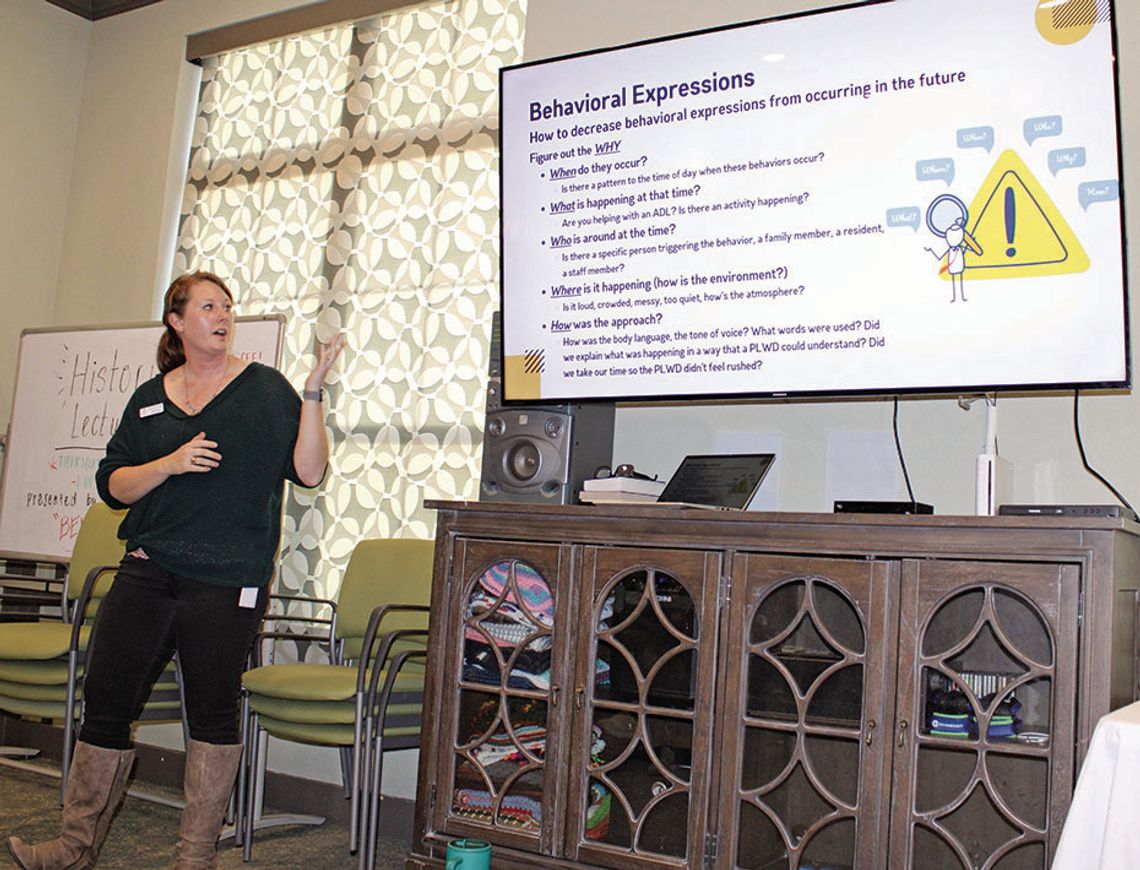With Alzheimer’s cases on a dramatic rise in the baby boomer generation, Hannah Calame, memory care director of Franklin Park Boerne, is presenting a seminar on Alzheimer’s and other dementia- related diseases at the senior care living facility.
The seminar, a three-part series, covers everything from recognizing symptoms, what to prepare for right after a diagnosis, how to decode behaviors and other expressions and the different types of therapy that have proven to be successful.
Calame, who has worked 11 years in senior assisted living facilities, said she found that memory care was where she felt she had the most impact, a key reason she created the three-part series.
“The more we share with each other, the more we can begin to understand the disease,” Calame said.
Calame is a firm believer in validation therapy, which discusses the importance of meeting an individual with Alzheimer’s in their own reality, rather than bringing them into yours.
“Painful feelings to be addressed, not dismissed,” Calame said. “Otherwise, the suppression will gain in strength.” Calame began the Jan. 22 second seminar by asking the attendees to create their regular morning to-do list. When everyone completed the exercise, she asked the attendees to note which steps had sub-steps, such as taking a shower.
A shower, which can sound like a simple step, has substeps, like washing your hair, using body wash, shaving, etc. The point, she said, was that what may be simple steps to us are not always so simple to individuals diagnosed with Alzheimer’s. Sub-steps can overwhelm them and make it easy to fail, which is why patience is key.
For those unsure if a loved one has Alzheimer’s, Calame presented a slide on common symptoms, such as repetitive questions, wandering, sleep disturbances, aggression, hoarding or even inappropriate sexual behavior. Each of these are considered behavioral expressions, a way for people living with dementia to communicate that they have a need that is not being met.
Calame used Maslow’s hierarchy of needs to help attendees understand the levels of diagnosis for an individual: physiological needs (water, warmth, rest); safety needs (security); belongingness (intimate relationships, friends); esteem needs (a feeling of accomplishment); and self-actualization (achieving one’s full potential, creative expression).
Once someone discovers which one of these needs should be addressed, it becomes easier to communicate.
“Stay away from therapeutic lies,” Calame warned, “as it is a practice that is being moved away from. This can break trust, and building trust is the most important thing we can do in dementia care.
“Be honest and redirect a loved one away from harmful behavioral expressions. Talk with them and create a situation that is more calm and pleasant,” she said.
An exercise Calame conducts with the seniors in her memory care unit is to plug in a citrus-based scent in the morning, to induce cognitive behaviors. At night, to relax everyone and destress, she uses a lavender scent to promote decompression.
One of the hardest lessons, Calame said, is to understand that those diagnosed with Alzheimer’s are no longer the people they once were. “I had a woman in my memory care unit whose husband would call every day at six in the morning to wake her up, because he was used to her being awake at that time.” Calame said. “It took us six months to get him to understand that she now prefers to sleep in a little more.
“She’s not that person anymore, and that’s OK. You cannot make them feel guilty for changing, because it is not their fault,” she added.
Patience, communication and the preservation of dignity are the golden rules for dementia.
Calame urges people to practice short explanations, and to allow ample time for comprehension — “always practice 100% forgiveness.”
Therapies that Calame strongly suggests are reminiscence therapy, talk therapy, aromatherapy, art therapy, music therapy, pet therapy, dolly therapy and sensory stimulations.
Cheryl Scott, an attendee whose mother has Alzheimer’s, swears by music therapy.
“My mother used to be a musician,” Scott said, “and the sound of music calms her down. It’s worked wonders.”
The third and final seminar, which will be held 4:30-5:30 p.m. Jan. 29, at Franklin Park, 18 Old San Antonio Road, is open to the public. Calame encourages everyone to come out and learn more about this growing disease.
“We’ll be in theme, too, for the Chinese New Years,” she said. “We’ll be having Chinese food for anyone who wants to come out.”







Comment
Comments